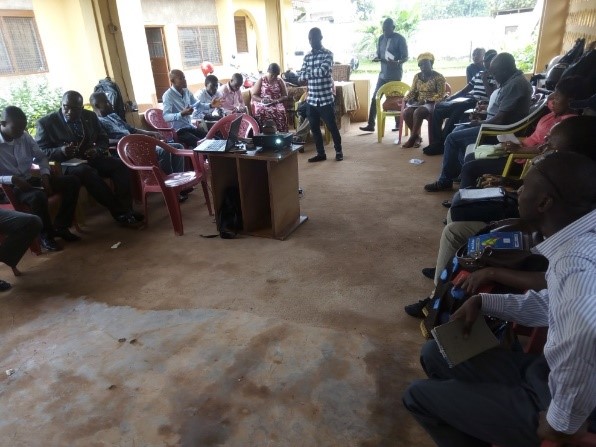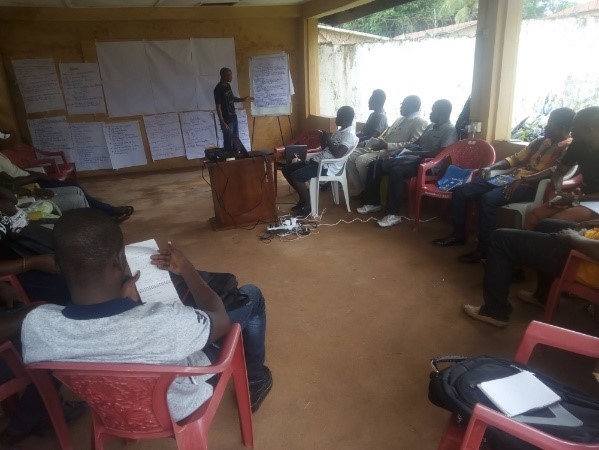STRENGTHENING CIVIL SOCIETY TO FIGHT CORRUPTION
The People Power Movement (PPM) Sierra Leone Secretariat has conducted regional level training of the institutional members of PPM and other civil society organizations (CSOs) on the national and international anti-corruption instruments and the role of CSOs in the fight against corruption in Sierra Leone. The trainings were conducted between October 24th and November 5th 2019 and targeted over 130 PPM and other CSO members across the Port Loko, Bo, Kenema, Bombali and Western Area Rural districts of Sierra Leone. The trainings were co-facilitated by Alhassan Kargbo, the Deputy Director of Public Education and Outreach Department of the ACC.
The training components captured the Regional, Continental, Global and local actions in tackling corruption such as the Economic Community Of West African States Protocol on The Fight Against Corruption (Dec 2001), The African Union Convention on Preventing And Combating Of Corruption (2003), The United Nations Convention Against Corruption (2002) and the Sierra Leone Anti-Corruption Act (No.16) of 2008. The structure, operations and powers of the ACC were thoroughly discussed. It was clear that the ACC was established by the government of Sierra Leone with the promulgation of the Anti-Corruption Act 2000 which gave the ACC its legal existence to investigate alleged instances of corruption and to prevent corrupt practices. However
the Anti-Corruption Act 2008 repealed and replaced the Anti-Corruption Act 2000 with the aim of strengthening the ACC to most effectively execute its functions and mandates. The novelty in the 2008 Act is that it gives the Commission the prosecutorial powers, powers for asset declaration of Public officials and also increases the offences of corruption from 9 to 27.
The trainings reechoed the voices of the CSOs on the Sierra Leone they would love to see. For instance, Mrs. Yakoya Kamara a CSO of Port Loko lamented that “I want to see a Sierra Leone where the ACC is independent and that even the Commissioner is not appointed by the President”.
Mr. Fallah A. Bockarie, the Executive Director of Foundation for Development, Democracy and Human Rights and member of PPM Kenema quoted Mary Robinson that “ if you don’t know your rights, you can’t claim it”, therefore the training was an eye opener to PPM and other CSOs to be best placed to advocate on issues of corruption.
“The initiatives on People Power Approaches to fighting corruption should reach every district and every chiefdom in Sierra Leone, this will change the narratives in corruption and corrupt practices in our country” says Osman Conteh, the Chairman of the Bike Riders Association Bombali and member of PPM.
“I will make sure that the knowledge I have acquired here reaches members of my staff and other coalitions that I belong” says Mrs. Rassie Bah, the Executive Director of Centre for Advocacy and Sustainable Development – Sierra Leone and Executive Member of PPM Bo District Chapter.
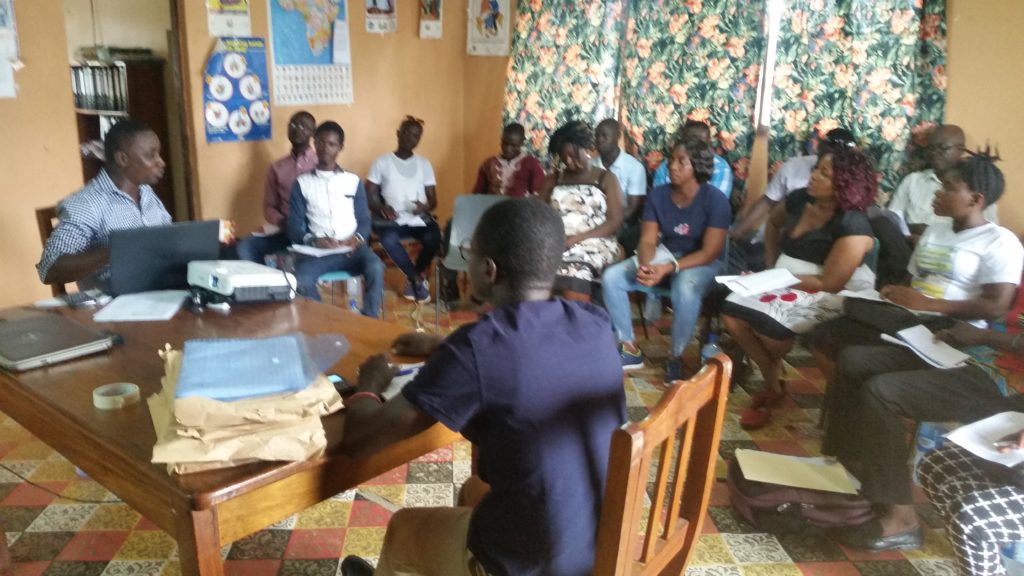
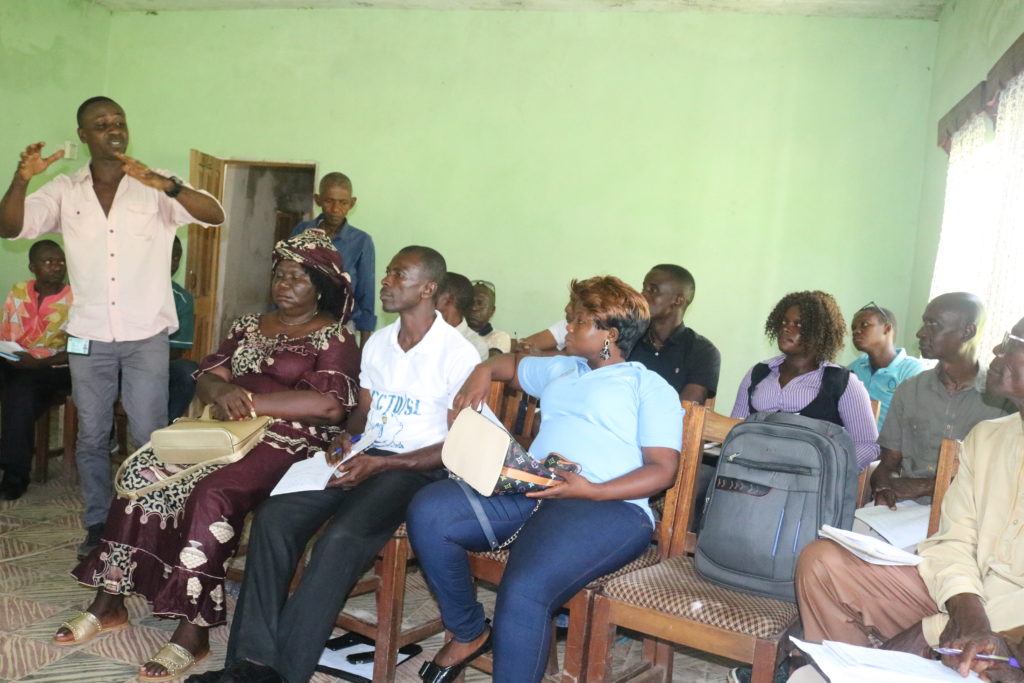
People Power Movement Sierra Leone (PPM-SL) and the Training Manual on People Power Approaches to Good Governance Launched
The launch of PPM and its training manual took place on May 29th 2019 in Freetown. The event targeted 55 individuals from all walks of life including students from tertiary institutions, secondary school pupils, commercial motor bike riders, civil society activists, development partners, teachers, children and youth groups. Mr. Augustine Foday Ngobie, Deputy Commissioner of the Anti-Corruption Commission (ACC), officially launched the Movement and the training manual, after his key note address. Speaking on behalf of the Commissioner, emphasized that People Power Approaches is a social accountability tool, which peacefully and constructively demand for rights from state authorities and service providers. He also remarked, “one strategic area of collaboration between the ACC and the PPM is in promoting awareness raisin and information sharing to the public, which is as a basic human right that would eventually enable citizens demand social and economic rights of citizens.”
Mrs. Lavina Banduah, Executive Director of Transparency International (TI) – Sierra Leone Chapter, Mrs. Abigail Stevens, Executive Director of Centre for the Coordination of Youth Activities and a member of the Africans Rising Coordinating Collective and lead for Africans Arising Movement – Sierra Leone Chapter, and Mr. Sahr Kendema, Programs Manager for Campaign for Good Governance (CGG), made statements of support to PPM and the use of the manual. Commissioner Braima Sheriff, a human rights activist, and former Chairman of the Human Rights Commission chaired the event.
Boi-Jeneh Jalloh presented the manual at the launch. Comments and questions were entertained from the guests. The comments included the need for PPM to consider having a citizens centre in communities where grievances can be heard and advise and support provided, and how to apply people power in educational institutions. Mr. Mohamed Sillah, Executive Director of Action Aid Sierra Leone, particularly commented that there was need for people to have a deep reflection on the role they have played in fostering corrupt practices and bad governance in society and think for a turn around. He said people resort to finding alternative means to poor road by buying jeeps to ride over the roads, and power generator to substitute public power supply and fail to report/ protest about such poor governance issues. The failure to protest / report about such poor service delivery is a form of aiding bad governance. He added that reminding the government of their roles and responsibilities is a form of promoting good governance
Several other participants expressed elation on the launch of PPM and its training manual and emphasized that development could be sustainable if the people are empowered, therefore the fight against corruption should be people centered approach and the training manual was a potent tool to empower the people to hold their duty bearers accountable through nonviolent means.
The launch highlighted the possibilities to explore low-risk participatory approaches that would not only empower citizens, but also engage them to influence how government works at all levels. The use of the training manual will increase opportunities toward mobilizing a critical mass of citizens at all levels, including the youth, who would use the methods more often to demand good governance and accountability to influence social change. Limited copies of the training manual were distributed to the guest. They were directed to the PPM website to access the PDF copy of the manual. This strategy would also ensure that PPM members, non-governmental organizations, and community-based organizations in the districts and with limited access to internet connectivity have access to the hard copies of the manual
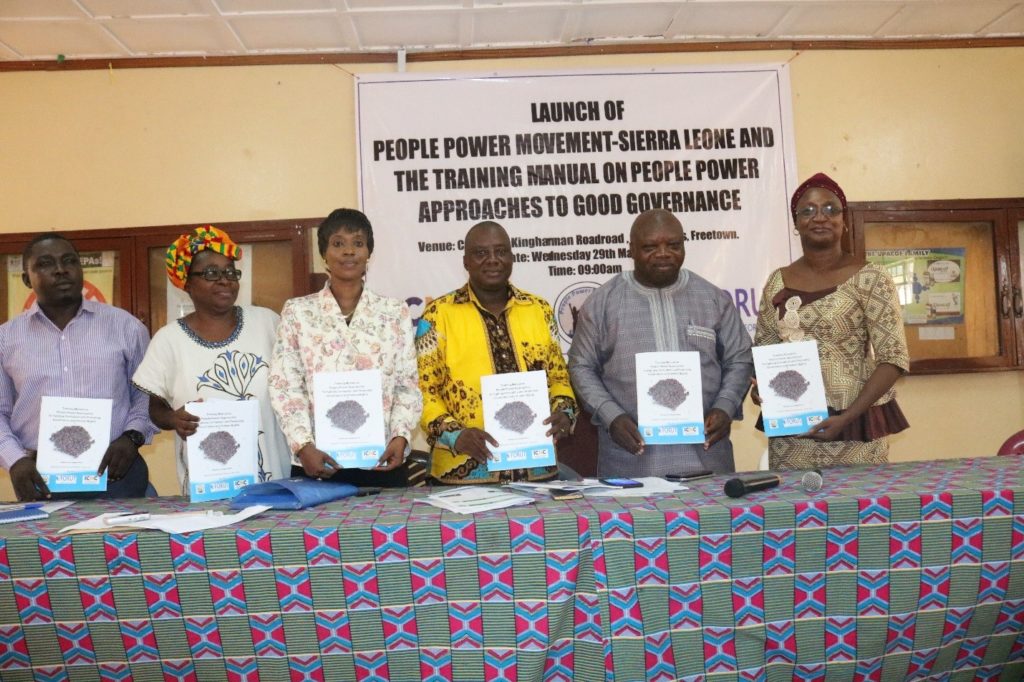
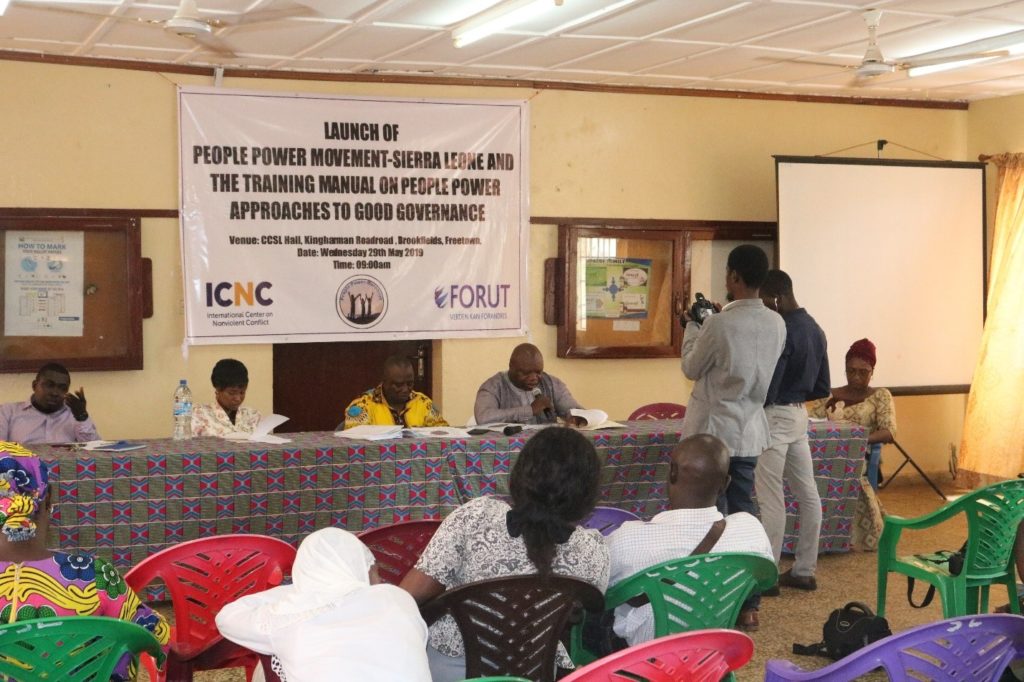
PPM in Kenema takes step to fight corruption
The PPM Kenema District Chapter was formed immediately after the training. The Chairperson and vice Chairperson are Augustine Sannoh and Fatmata Barrie of Civil Society Movement and Gbortima Women’s Development Association respectively. 12 out of the 20 participants are active members. The PPM leadership mobilizes its membership to take practical steps to demand accountability and fight corruption in service delivery in the city.
The PPM training was conducted in Kenema in July 2018. Eight months after the training, Edward A. Kai one of the trainees explained the change he has realised since he received the training.
Eight months after the training, Mr. Edward A. Kai, Secretary to PPM Kenema Chapter and staff member of Movement for Resettlement and Rural Development (MoRRD) proudly narrated how he mobilised PPM Members and other civil society activists to protest against the poor quality of the township road under construction. He said, “We protested that the work must stop until the Bill of Quality (BoQ) is shared with us, and we understand how the procurement for materials was planned. After persistent engagements with the Contractors and Councillors and Mayor of the Kenema City Council, the construction company reluctantly gave us a copy of the BoQ. The construction work is moving on smoothly and in good quality.’
Ms. Miatta Jusu, National Coordinator Women’s Empowerment Association for Progress, also explained the successes she has made since the training, “I can see a sense of resistance to corruption in my city now. When people talk about corruption, fingers are always pointed at teachers. I mobilized our PPM Members to engage school teachers and pupils to understand that demanding payment for practical lessons, assignments and teachers’ birthdays are corrupt practices. Over 50 schools have been reached and some of the teachers have stopped demanding money from the pupils. Some teachers continue to demand for such money, but most of the students are now refusing to pay to.”
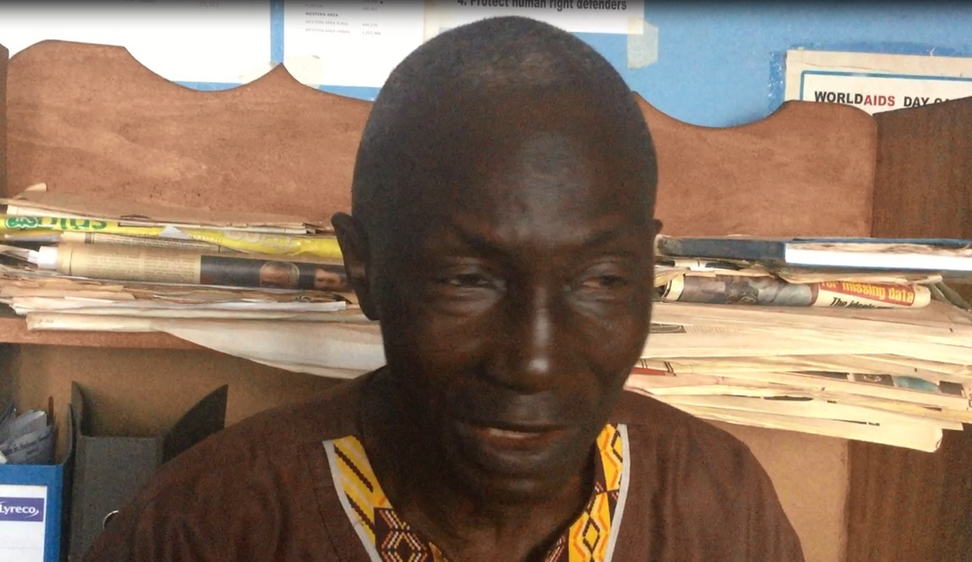
PEOPLE POWER MOVEMENT EXECUTIVE MEETS WITH FRANCIS BEN KEIFALA, ANTI-CORRUPTION COMMISSIONER
People Power Movement (PPM) has identified corruption as the vanguard for underperformance in public sector service delivery which is the trigger for national unrest and instability. The Movement focuses on mobilizing grassroots understanding and action support in the campaign to fight corruption and promote good governance.
The Movement is seeking partnership with various stakeholders. In its drive to strengthen collaboration with the national anti-graft agency, the Executive of the Movement paid a courtesy visit to the Commissioner of the Anti-Corruption Commission (ACC), Francis Ben Keilfala, at his Gloucester Street office in Freetown on March 19, 2019.
The PPM Chairperson and Director of Direct Response Ibrahim Kamara introduced the team to the Commissioner, and the Head of PPM Secretariat, who is also the Executive Director of FoRUT, Ms. Boi-Jeneh Jalloh explained the purpose of the meeting, which was to introduce the PPM, solicit ACC support for the work of PPM and request for collaboration in promoting good governance and the fight against economic and financial crime in Sierra Leone.
The Head of Secretariat, Mrs. Boi-Jeneh Jalloh highlighted the support PPM could contribute to the national fight against corruption, which could include the following;
- Blacklisting corrupt candidates and citizens from holding public offices;
- Conduct public education and sensitization on corruption, good governance and human rights;
- Share evidence on corruption issues affecting the poor and marginalized;
- Mobilize citizens to use people power methods to resist corruption; and
- Promoting and deepening zero tolerance to corruption among PPM members and other non-state actors.
The ACC Commissioner, Mr. Francis Ben Keilfala, welcomed PPM Executive to his office and expressed appreciation in collaborating with civil society. He said the ACC staff strength was just 204 and it cannot be everywhere, see everything, hear everything and even capture everything. He added that the strategic collaboration the ACC has had with Civil Society Organizations was to increase its strength on the outside. “Let our collaboration add mutual value to our work for social change in Sierra Leone” says the Commissioner. He concluded that the Director of Outreach, Mr. Sandi, would conduct background check on PPM and subsequently sign a Memorandum of Understanding to mark the dawn of effective partnership with PPM
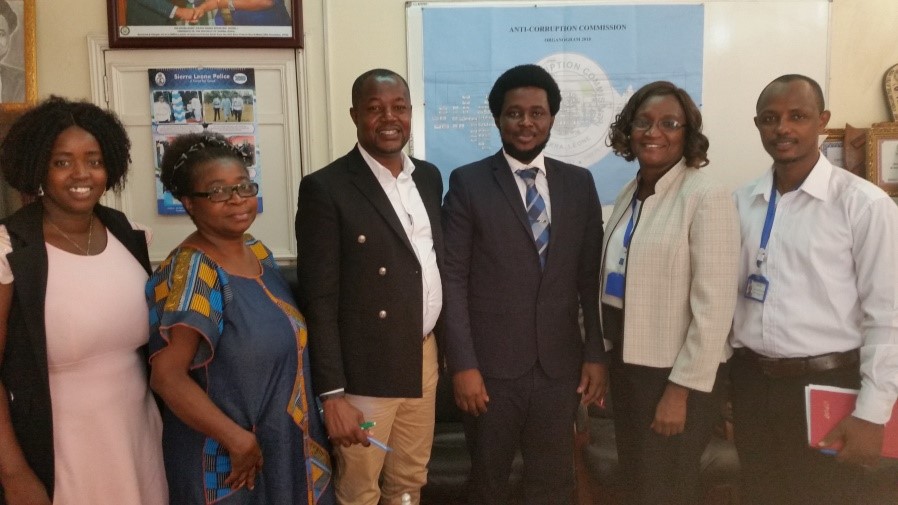
CSOs in Kenema and Bo are knowledgeable about People Power Non-violent Methods to support demands for Accountability, Human Rights and Good Governance
Forty representatives from civil society organizations (CSOs) from Bo and Kenema, 12 of whom were women, received a two-day training on how to use people power nonviolent methods to fighting corruption, promoting good governance and human rights, in July 2018.
The training enabled the CSO representatives to broaden their understanding of what corruption is, and how it affects, particularly the poor. They also had thorough understanding of the power of ordinary citizens, how to harness and exercise that collective power through nonviolent methods to resist corruption. People power is best used to fight the everyday petty corruption that denies citizens their right to access public services.
The participants identified a number of governance and corruption related challenges that are also common in other districts. Key challenges discussed at the training were the payment of illegal charges in health facilities, which deny lactating mothers, pregnant mothers and children under five their right to free health care under the Free Health care Initiative; poor oversight of school subsides; delay in supply of rice seeds to farmers by the Ministry of Agriculture and Forestry; and potential illegal charges in the Free Quality School Education (FQSE) programme.
In each of district trainings, CSOs developed an action plan to address some of the issues raised. They included: engaging school authorities and the Deputy Directors of the District Education Offices, and monitoring and reporting on corrupt practices in the health facilities and schools.
The facilitators for the two trainings were Mr. Haji Bah, PPM Communication Officer, Mrs. Boi-Jeneh Jalloh, Executive Director of Foundation for Rural and Urban Transformation and Head of PPM Secretariat, and Mr. Samuel Kargbo, PPM Coordinator and Programme Officer of FoRUT.
